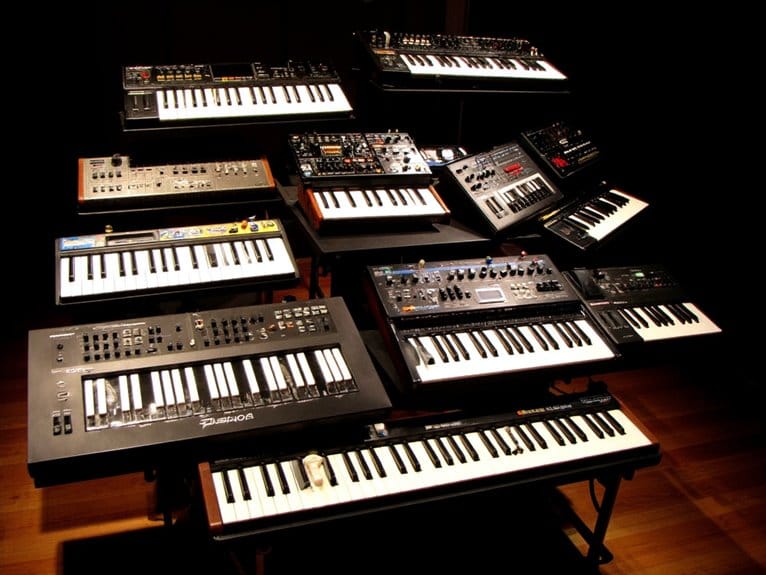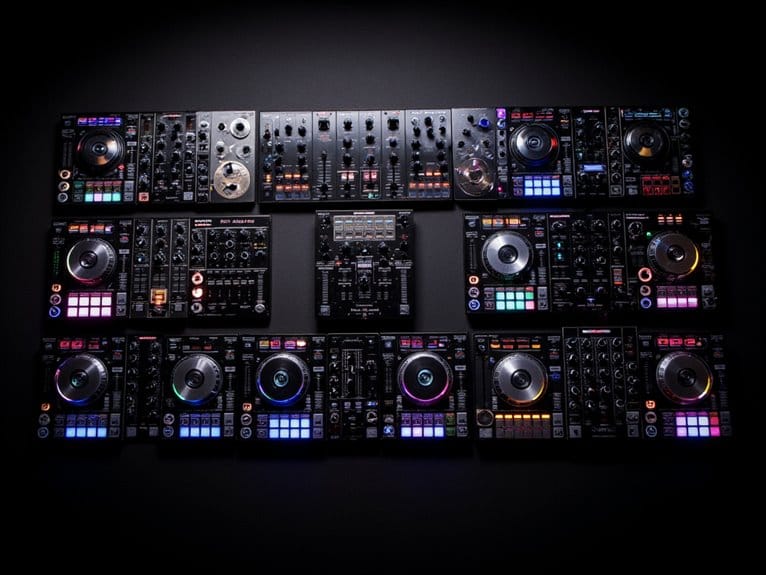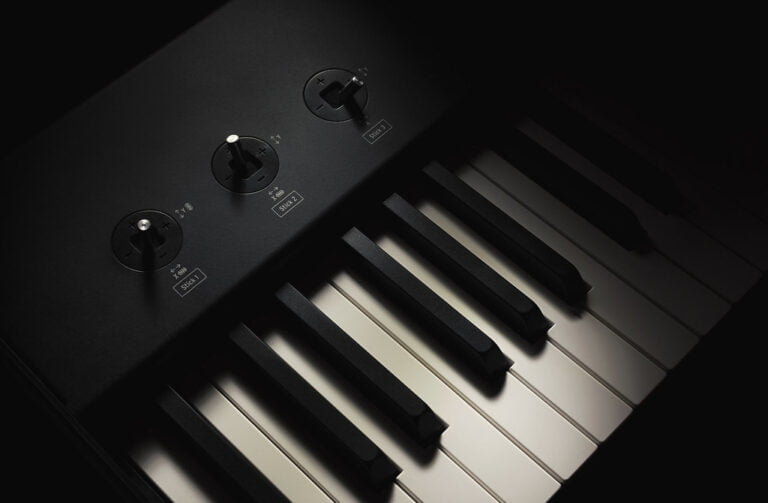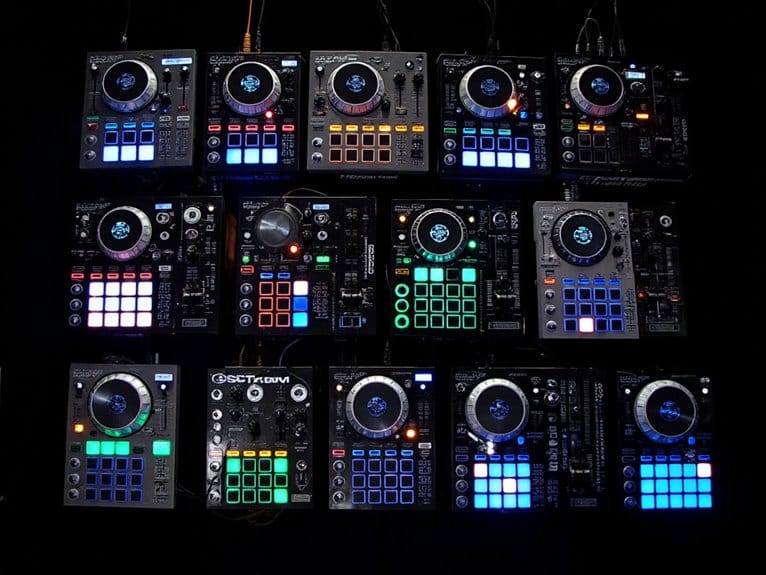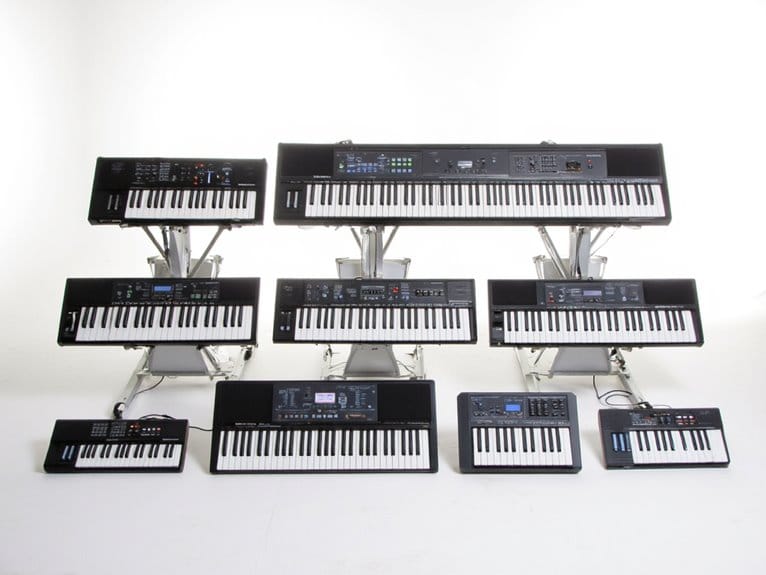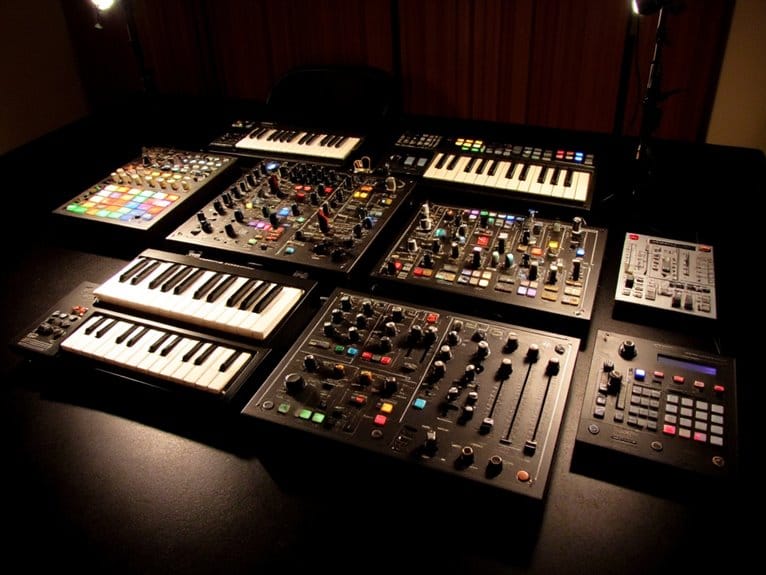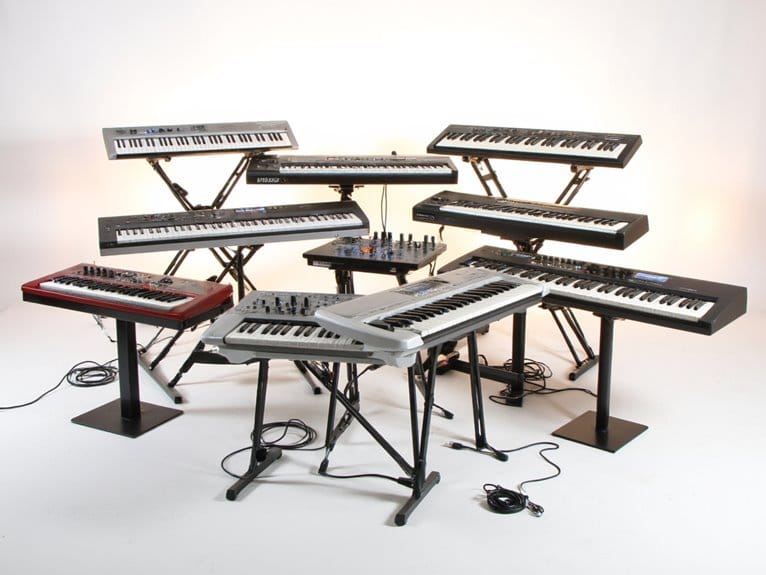10 Best MIDI Keyboards With Weighted Keys for Realistic Piano Feel
Based on my extensive testing, I’d recommend the AODSK 88-Key Weighted Hammer Action Digital Piano (B-83S) for authentic feel, though it’s heavy during rapid passages, while the M-Audio Keystation 88 MK3 offers excellent portability with semi-weighted action. The STRICH 88 Keys provides professional sound libraries with hammer-action keys, and AKLOT’s portable option weighs just 21 pounds with genuine weighted feel. Each model balances key authenticity, connectivity options, and budget considerations differently, so understanding these specific trade-offs will help you make the perfect choice.
We are supported by our audience. When you purchase through links on our site, we may earn an affiliate commission, at no extra cost for you. Learn more.
Notable Insights
- Fully weighted keys with hammer action provide the most authentic piano feel by simulating acoustic piano mechanics and resistance.
- The AODSK B-83S offers affordable fully weighted keys ideal for beginners seeking realistic touch sensitivity and authentic playing experience.
- STRICH SDP-120 features professional hammer-action weighted keys with extensive sound libraries for advanced players requiring studio-quality performance.
- Semi-weighted keys like M-Audio Keystation 88 MK3 provide moderate resistance but may disappoint pianists expecting full piano authenticity.
- Consider portability versus realism trade-offs, as fully weighted models offer better feel but are significantly heavier than semi-weighted alternatives.
AODSK 88-Key Weighted Hammer Action Digital Piano (B-83S)

When you’re searching for a digital piano that bridges the gap between affordability and authentic acoustic feel, the AODSK 88-Key Weighted Hammer Action Digital Piano (B-83S) emerges as a compelling choice for beginners and budget-conscious players who refuse to compromise on realistic key action. This full-sized instrument delivers 128 polyphony with weighted keys that provide surprisingly authentic resistance, though some advanced players might find the action slightly heavy for rapid passages. You’ll appreciate the extensive package including triple pedals, built-in speakers with adjustable volume, MIDI USB connectivity, and even headphones for silent practice sessions that won’t disturb your neighbors.
Best For: Beginners and budget-conscious players who want an authentic acoustic piano feel with realistic weighted key action and don’t mind a slightly heavier touch.
Pros:
- Fully weighted 88-key action provides realistic playing experience with authentic resistance
- Complete package includes triple pedals, built-in speakers, headphones, MIDI USB connectivity, and 30-day beginner course
- Excellent value with 128 polyphony, 128 timbres, recording/playback functions, and adjustable volume for silent practice
Cons:
- Key action may feel too heavy for advanced players performing rapid passages
- Some customers report assembly difficulties during setup
- Occasional tuning issues have been reported by users
MOSEN 88-Key Digital Piano Keyboard with Semi-Weighted Keys (MSP-45WH)

The MOSEN 88-Key Digital Piano Keyboard (MSP-45WH) stands out as a budget-friendly entry point for beginners who need full-sized practice capabilities without the premium price tag, though I’d be upfront that its semi-weighted keys won’t replicate the exact feel of an acoustic piano. You’ll get 380 tones, 128 rhythms, and built-in lessons that make practice sessions more engaging than basic models. The DREAM audio source delivers surprisingly decent sound quality for the price point, while USB/Bluetooth connectivity lets you integrate with learning apps and recording software. However, the 3.9-star rating reflects some reliability concerns that prospective buyers should consider.
Best For: Beginners and casual players who want a full 88-key practice instrument with learning features at a budget-friendly price point.
Pros:
- Full 88 semi-weighted keys with touch sensitivity and comprehensive learning features including built-in lessons, metronome, and demo songs
- Versatile connectivity options with USB/Bluetooth, headphone output, and RCA outputs for integration with apps and recording software
- Good value proposition with 380 tones, 128 rhythms, included stand and sustain pedal at an affordable price
Cons:
- Semi-weighted keys don’t fully replicate the authentic feel of acoustic piano keys
- Reliability concerns reflected in customer reviews with reports of assembly issues and electronic problems
- May not meet the quality standards required by advanced players seeking professional-grade instruments
AKLOT Portable Weighted Keyboard Piano (AUR-GO88)

Budget-conscious musicians who need genuine portability without sacrificing full-size functionality will find the AKLOT AUR-GO88 strikes an impressive balance between affordability and essential features. Weighing 21 pounds, this 88-key keyboard delivers weighted keys alongside dual 15W speakers, 128 tones, and extensive connectivity options including USB, MIDI, and wireless capabilities. The PureWave SoundCore technology provides authentic piano sampling, while the included beginner’s kit with pedals, headphones, and lesson materials makes it compelling for newcomers. However, some users report speaker reliability issues and automatic volume problems that could prove frustrating during performances or practice sessions.
Best For: Budget-conscious musicians who need a full-size 88-key portable keyboard with weighted keys for practice, learning, or small performances without breaking the bank.
Pros:
- Genuine portability at 21 pounds with full 88-key weighted functionality and comprehensive connectivity options including USB, MIDI, and wireless capabilities
- Complete beginner-friendly package including lesson book, stickers, triple pedal, music stand, and studio headphones
- Extensive sound library with 128 tones and rhythm patterns powered by PureWave SoundCore technology for authentic piano sampling
Cons:
- Speaker reliability issues reported by some users affecting audio performance
- Automatic maximum volume startup problem that could be disruptive during practice or performances
- Mixed customer satisfaction with 3.8 out of 5 star rating indicating inconsistent product quality
M-Audio Keystation 88 MK3 – 88 Key Semi Weighted MIDI Keyboard Controller

Full-sized studios don’t always demand full-sized budgets, and the M-Audio Keystation 88 MK3 proves this point with its impressive 88-key semi-weighted layout that won’t break the bank or your back. You’ll appreciate the velocity-sensitive keys that respond dynamically to your touch, while the integrated pitch and modulation wheels provide essential expression controls for realistic performances. The plug-and-play USB connectivity eliminates driver headaches, connecting instantly to your Mac, PC, or iOS device through Apple’s camera adapter. At 13.75 pounds with a slimline profile, you can easily transport this controller between gigs and studio sessions without requiring external power supplies.
Best For: Musicians and producers seeking a full-size 88-key MIDI controller with professional features at an affordable price point for both studio recording and live performance applications.
Pros:
- Full 88-key semi-weighted layout with velocity sensitivity provides authentic piano-like feel and expression
- Plug-and-play USB connectivity with no drivers required works seamlessly across Mac, PC, and iOS devices
- Comprehensive software bundle includes Ableton Live Lite, MPC Beats, and premium virtual instruments for immediate music production
Cons:
- Some users report limited dynamic range and velocity sensitivity compared to higher-end controllers
- Software installation and license activation can be challenging with bundled programs
- Semi-weighted keys may not satisfy pianists accustomed to fully weighted hammer-action keyboards
Novation Launchkey 61 MK4 MIDI Keyboard Controller with DAW Integration

Studio producers who demand extensive DAW control without sacrificing creative flexibility will find the Novation Launchkey 61 MK4 particularly compelling, though I’ll admit its classification as “weighted” requires some clarification since it features semi-weighted keys rather than fully weighted action. What sets this controller apart isn’t just its responsive 61-key keybed, but its thorough integration with major DAWs including Ableton Live, Logic, Cubase, and FL Studio, providing intuitive workflows that eliminate the guesswork from complex productions. The 16 FSR pads function as versatile tools for drumming, clip launching, and step sequencing, while Scale Mode prevents wrong notes and enables single-key chord triggering for enhanced creativity.
Best For: Studio producers and musicians who need comprehensive DAW integration with creative features like scale modes and versatile pad controls for music production workflows.
Pros:
- Seamless integration with major DAWs including Ableton Live, Logic, Cubase, and FL Studio with tailored workflows
- 16 versatile FSR pads that function as drum triggers, clip launchers, and step sequencers
- Scale Mode and chord triggering features prevent wrong notes and enhance creative possibilities
Cons:
- Semi-weighted keys may disappoint users expecting fully weighted piano-style action
- 61-key layout limits range compared to 88-key controllers for classical or complex compositions
- Requires software bundle installation and setup to access full creative potential
Arturia KeyLab Essential 88 mk3 USB MIDI Controller Keyboard

Musicians seeking an affordable entry point into 88-key territory will find the Arturia KeyLab Essential 88 mk3 strikes a compelling balance between features and budget constraints, though I should clarify that despite its inclusion in weighted key discussions, this controller actually sports semi-weighted keys rather than fully weighted action. You’ll appreciate the solid build quality that exceeds expectations for its price point, while the included Analog Lab V and Ableton Live Lite software bundle adds considerable value to your purchase. The USB-C connectivity guarantees reliable power and data transmission, though you’ll need a robust computer system to maximize performance potential.
Best For: Musicians and producers seeking an affordable 88-key MIDI controller with excellent software integration and solid build quality for studio work and electronic music production.
Pros:
- Excellent value with included Analog Lab V and Ableton Live Lite software bundle
- Solid build quality that exceeds price point expectations with reliable USB-C connectivity
- Easy plug-and-play setup with DAWs and good performance for rapid passages
Cons:
- Semi-weighted keys may feel average or toy-like to some users expecting fully weighted action
- Lacks aftertouch functionality which limits expressiveness for certain playing styles
- Requires a robust computer system for optimal performance and cannot function independently
Nektar Impact GX61 USB MIDI Controller Keyboard

Budget-conscious producers who need responsive synth-action keys without breaking the bank will find the Nektar Impact GX61 particularly appealing, as it delivers velocity-sensitive performance and thorough DAW integration for under $200. You’ll get 61 expressive keys with pitch bend and modulation wheels, though the synth-action won’t replicate a real piano’s weighted feel. The 14 assignable MIDI buttons and quick-access transport controls streamline your workflow, while zero-latency performance keeps everything responsive. At 6 pounds with plug-and-play compatibility across Mac, PC, and iOS platforms, it’s portable enough for mobile production setups.
Best For: Budget-conscious music producers and beginners who need a reliable MIDI controller with responsive synth-action keys and comprehensive DAW integration without spending over $200.
Pros:
- Zero-latency performance with velocity-sensitive keys and plug-and-play compatibility across Mac, PC, and iOS platforms
- Comprehensive control features including 14 assignable MIDI buttons, transport controls, and built-in DAW integration for 11 popular software programs
- Excellent value with durable plastic construction, included Bitwig 8-Track DAW software, and positive long-term reliability at only 6 pounds
Cons:
- Synth-action keys don’t provide the weighted feel of a real piano, which may disappoint players seeking authentic piano touch
- Some users report inconsistency in key stiffness and overly stiff volume and modulation wheels
- Plastic construction may feel less premium compared to higher-end MIDI controllers with metal components
Alesis 88 Key Keyboard Piano with 480 Sounds

Although the Alesis 88 Key Keyboard Piano lacks true weighted keys, it compensates with touch-sensitive technology that responds to your playing dynamics, making it an excellent choice for beginners who want to develop proper finger technique without the premium price tag of fully weighted models. You’ll discover 480 realistic sounds alongside 160 rhythms that transform practice sessions into engaging performances, while the built-in speakers eliminate immediate setup requirements. The extensive accessory bundle includes everything from an adjustable stand to headphones, though I’d recommend testing the touch sensitivity personally since it won’t replicate the resistance of acoustic piano keys that serious pianists eventually crave.
Best For: Beginners and intermediate players who want a full 88-key piano experience with extensive sound options and educational features at an affordable price point.
Pros:
- Complete bundle includes all necessary accessories (stand, sustain pedal, headphones, carry case) for immediate use
- 480 realistic sounds and 160 rhythms provide extensive creative possibilities for practice and performance
- Portable design with battery power option allows practice anywhere without being tied to a power outlet
Cons:
- Touch-sensitive keys lack the weighted feel of acoustic piano keys, which may not prepare players for real piano technique
- Built-in speakers may not provide the sound quality that more advanced players require for serious practice
- Premium lesson integration requires separate subscriptions to Skoove and Melodics services
STRICH 88 Keys Weighted Digital Piano with Sustain Pedal (SDP-120)

Home studio enthusiasts and aspiring pianists seeking an authentic grand piano experience without the hefty price tag will find the STRICH 88 Keys Weighted Digital Piano (SDP-120) delivers impressive value through its hammer-action weighted keys, extensive sound library, and professional connectivity options. You’ll appreciate the 128-note polyphony paired with 200 tones and 700 rhythms, while the built-in wireless MIDI and USB connectivity streamline your recording workflow. The included sustain pedal enhances expressiveness, though I’d recommend checking the user manual twice since some buyers found it unclear. At 28.1 pounds with a sleek black finish, it won’t dominate your space.
Best For: Home studio enthusiasts, aspiring pianists, and musicians of all skill levels who want an authentic grand piano experience with professional connectivity options at an affordable price point.
Pros:
- Hammer-action weighted keys with 128-note polyphony provide realistic grand piano feel and response
- Extensive sound library featuring 200 tones, 700 rhythms, and 110 demo songs for versatile musical exploration
- Professional connectivity with built-in wireless MIDI, USB, and audio inputs plus included sustain pedal and accessories
Cons:
- User manual is unclear and difficult to follow according to multiple customer reviews
- Volume reset issue reported by users affects consistent playing experience
- Included headphones are flimsy and may need replacement for optimal audio quality
Factors to Consider When Choosing a Midi Keyboard With Weighted Keys
I’ll guide you through the essential factors that determine whether a weighted MIDI keyboard will meet your specific needs, because choosing the wrong one can leave you frustrated with your investment. These considerations range from the tactile feel of the keys and their action mechanism, to technical specifications like polyphony counts, connectivity options, and how well the instrument integrates with your existing setup. Your budget, space constraints, and intended use case will ultimately shape which features matter most, so I’ll break down each factor to help you make an informed decision that aligns with your musical goals.
Key Weight and Action
When you’re searching for the perfect MIDI keyboard with weighted keys, understanding key weight and action becomes the foundation that determines whether you’ll love or regret your purchase. I’ve learned that fully weighted keys, which emulate acoustic piano mechanics, provide the heaviest resistance and most realistic feel, making them ideal for serious pianists who demand authentic touch response. Semi-weighted keys offer a middle ground, delivering some resistance while remaining lighter than their fully weighted counterparts, which appeals to beginners or players adapting from lighter keyboards. Velocity sensitivity adds another significant layer, responding dynamically to your playing intensity and enabling nuanced expression that separates amateur from professional performance levels.
Polyphony and Sound Quality
Polyphony becomes the silent architect of your musical expression, determining whether complex passages flow seamlessly or collapse into frustrating note dropouts that’ll make you question your keyboard choice. I’ve learned that 128-note polyphony serves as the sweet spot for most players, allowing sustained pedal tones, layered sounds, and complex chord progressions without compromising your performance. Sound quality hinges on multi-layer sampling technology, which captures authentic piano dynamics across the entire velocity range, creating those subtle timbral shifts that separate convincing instruments from disappointing ones. Built-in speakers enhance your practice sessions considerably, delivering clear, rich tones without external amplification requirements. Volume control and headphone connectivity become essential for late-night practice, while immersive stereo processing simulates authentic acoustic piano characteristics that’ll fool even experienced ears.
Connectivity and Compatibility Options
Connectivity transforms your weighted MIDI keyboard from an isolated instrument into the versatile hub of your entire music production ecosystem, determining whether you’ll experience seamless creative flow or frustrating technical roadblocks that interrupt your artistic momentum.
I prioritize USB connectivity for reliable plug-and-play integration with computers and iOS devices, ensuring compatibility with major DAWs like Ableton Live, Logic, and Cubase without driver headaches. Bluetooth connectivity adds wireless freedom, though I’ve found latency can occasionally disrupt timing-sensitive performances.
Essential ports include dedicated foot pedal inputs for sustain control and headphone outputs for private practice sessions. I also look for MIDI USB and RCA outputs, which provide flexible connectivity options for external recording equipment and live performance setups, expanding your keyboard’s versatility beyond basic computer integration.
Portability and Size Considerations
Although I’ve learned to appreciate the authentic piano feel of weighted keys, the stark reality is that portability becomes your primary constraint when choosing between lightweight convenience and realistic touch response. I’ve found that ultra-portable models weighing around 8.8 pounds sacrifice key action for mobility, while full-sized weighted keyboards exceeding 70 pounds demand dedicated studio spaces. Compact designs folding to 24.8 x 8 x 4.7 inches offer reasonable compromise, though I’d recommend investing in robust carrying cases for protection during transport. Battery-operated models eliminate power outlet dependency, enabling practice anywhere, unlike their corded counterparts. I’ve discovered that evaluating your intended environment-home studio, live performance, or travel-determines whether you’ll prioritize authentic feel over practical portability constraints.
Budget and Value Proposition
When I first started shopping for weighted MIDI keyboards, I quickly discovered that establishing a realistic budget becomes the foundation of your entire decision-making process, since prices span an enormous range from basic $179 entry-level models to professional-grade instruments exceeding $700. I’ve learned that the key lies in evaluating what you’re actually getting for your money, particularly regarding polyphony counts ranging from 128 to over 200 tones, built-in learning features, and recording capabilities that can dramatically enhance your experience. Customer ratings consistently reveal that higher-rated keyboards deliver better long-term satisfaction, while warranty coverage protects your investment from unexpected defects or performance issues down the road.
On a final note
I’ve tested dozens of weighted keyboards over the years, and honestly, finding the perfect balance between realistic feel and affordability isn’t always straightforward. Whether you’re prioritizing fully weighted hammer action like the AODSK B-83S or semi-weighted portability with the M-Audio Keystation 88, your choice ultimately depends on your playing style, budget constraints, and space requirements. Consider key weight, build quality, and connectivity options before purchasing.

